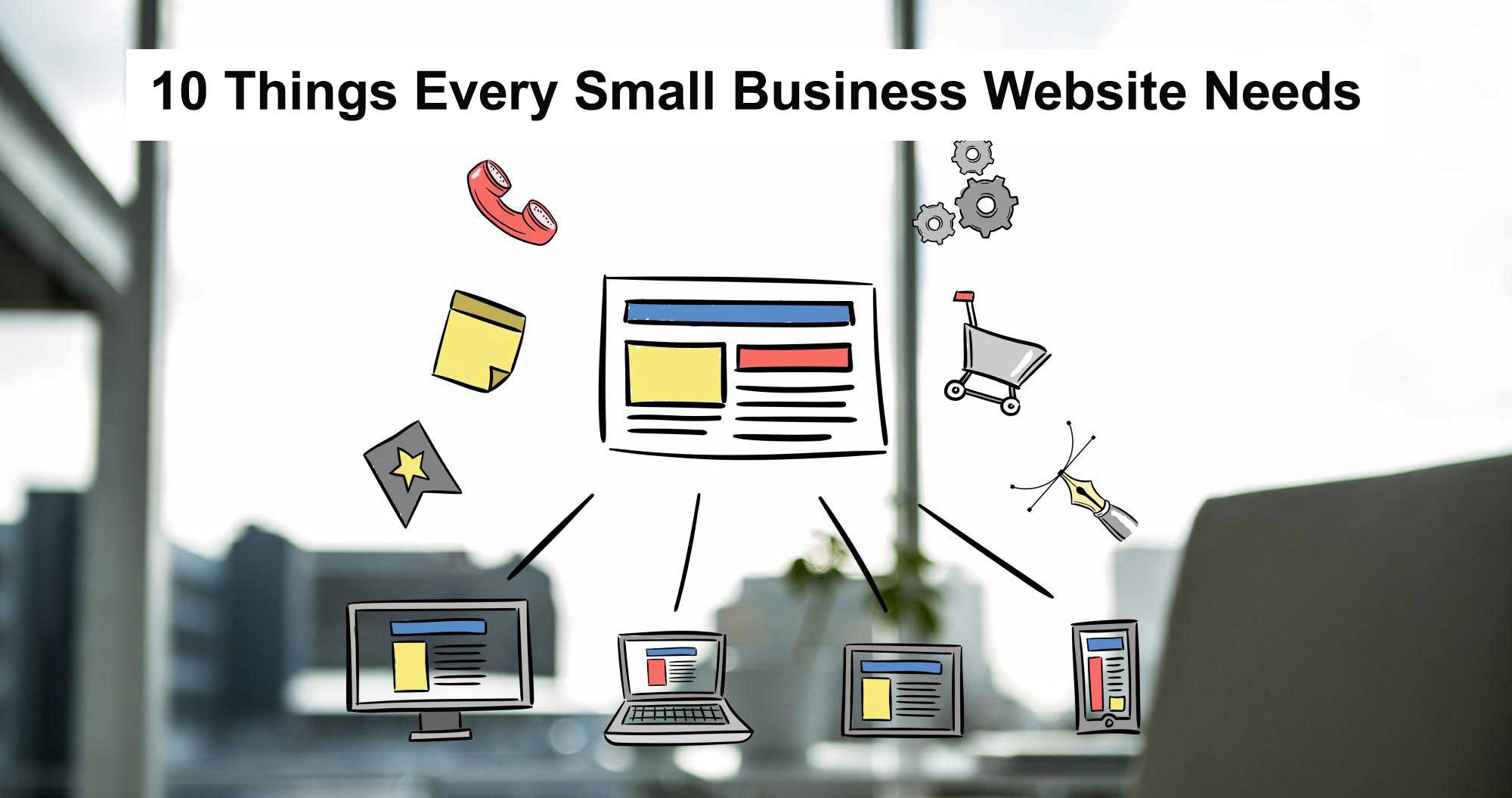10 Things Every Small Business Website Needs
No small business is complete without a professional website that serves as their 24/7 storefront. A successful small business website has specific elements that can’t be ignored. There are over 1.5 billion websites on the World Wide Web today. Of these, less than 200 million are active. How do you manage to stand out in this ocean of websites – What does a good website need?
Each element on your website plays an important role to make an impact on your customers to order your product or pay for the services your business offers to them. Here, we are going to talk about 10 important things or elements that every small business website needs to have on their website in order to create a great impact on the user or customer.
1. A Clear Explanation of Your Business
People should know exactly what you or your business is about within a few seconds of them landing on our website. A website which confuses or misleads visitors will draw negative impact on your business. Visitors shouldn’t have to do investigative work to figure out what your website is about. Your homepage should be such that anyone who visits the site should be able to understand your business and the services or products offered within a few seconds. Mention the benefits of your product or service so people know what they expect to get from your business. Also have an “About Us” section where you can tell your company’s origin story, goals and purpose.
2. Clear and easy Navigation
The navigation of a website is important in helping visitors quickly find the content they want. It can also help search engines understand what content the webmaster thinks is important. Use clear navigation headers, and sub-service menus to keep every single page easily accessible to the user. Simplicity is always best. You want to be sure that regardless of where someone is on your site, they’re only a single click away from your main pages. Clear links to the most important pages, and a site map, are crucial for guiding visitors to the information they’re looking for. You want to make it very easy for your visitors to find what they are looking for, or what you want them to know.
3. Mobile Friendly pages
The world is using mobile phones today more than ever before. If the desktop version of a site is difficult to view and use on a mobile device then that’s a big issue for your online presence. When you’re designing your website, you need to take into account that most people that are viewing it are doing so on their Smartphone. Using a using responsive web design is very important in order to properly render the website pages on various mobile devices.
4. Clear Calls-To-Action and Contact Information
Every lead is important and especially for a small business. Make it very clear to the online visitors literally what you want them to do. You may want them to call you, or sign up, or fill out a form, etc. Add a noticeable call-to-action by using special buttons or highlighting the text.
Also you wouldn’t want to lose a customer just because you made it difficult for them to get in touch with you. It is also a good practice to include contact information in every page of the website at a prominent place, which helps the visitors to find it more easily. You should also be sure to include several ways for them to contact you – phone, e-mail, and a standard contact form, are all good options.
5. Customer testimonials/reviews
Online reviews matter and that’s why you need to create and maintain a process that encourages your customers to leave reviews, monitors the reviews they leave, and improves any negative reviews you might receive.
Key Statistics shows that 91% of consumers trust online reviews as much as personal recommendations.
Testimonial helps your potential customers to build trust in you, especially if you are new in the market. If you’re selling products or services, you need to make visitors feel comfortable associating with you. This is where positive testimonials or even proof of your work come into play.
6. Quality Content & Web Design
You surely want your website to look and read professional. Your website needs to look fresh and modern. Keep it neat and know where to place videos, text and images to provide the best viewing experience for your visitors. Avoid cluttered layout on your website. When a business has a well-designed website, it becomes easier to get more customer conversions. This is because a well-designed website uses its elements to lead customers directly to what they need without distractions.
To enhance a user’s experience on your small business website, you have to make sure that the content on your website is relevant, error free and easy to read. Use high quality images/videos and informative content to keep your visitors engaged. Use blog articles and FAQ content to add value to your target audience.
7. Reliable hosting platform
It is vital to carefully research your hosting options before committing to a specific website hosting platform. Pick one that seems reputable and has good customer service reviews in the event of a crisis. Having your website is down; is surely not going to help your business. Ensure your hosting provider uses the best practices to secure your servers from hackers and updates your web software’s regularly. Using a fully managed hosting service ensures your website is always updated and properly maintained.
8. Social media integration
Social media will help you to create a brand of your own. Especially for an e-commerce site, social media optimization is very important, as now people use social recommendation for buying products online. Make sure to add all links to your social channels somewhere on your home page, preferably in the footer, so visitors can follow you on the channels they prefer.
Include social share buttons on your website for Facebook, Twitter, Pinterest, and social bookmarking sites, etc. This are cost free way to increase online presence through shares, and online visibility for your business.
9. Awards, Certifications, or Associations
These builds credibility, speaks about the quality of your work, and supports your image as an expert in your field and a trusted business partner. Like testimonials – awards, certifications, and associations prove that you’re trustworthy and reliable. As a small business owner this would help you immensely to build confidence in your visitors and convert them into long term customer or clients. A must have for self-employment professionals like attorneys, doctors and freelancers.
10. SSL Certificate
In this day and age, a secure website is no longer optional, and SSL certification is now a “must-have” for any business website. Secure Socket Layer (SSL) protocol is responsible for creating secure communication between a website and its visitors. Google’s updated browser now displays a Not Secure message in the URL of any website that does not have SSL. A “Not Secure” notice could have a dramatic impact on your business by preventing visitor engagement.
Additional Mention
SEO – Your website won’t do you any good if no one can even find it. More than 70% of consumer searches on the Internet are for local businesses, so you need to make sure your website is easily found by optimizing for the right keywords and making use of the essential SEO techniques that best suit your business website.
Considering a website redesign or building a new one?
Talk to us about your needs and we shall work on providing you the best online solution your business deserves. If you are a small business looking to get online, check out our small business website package or get in touch today.



